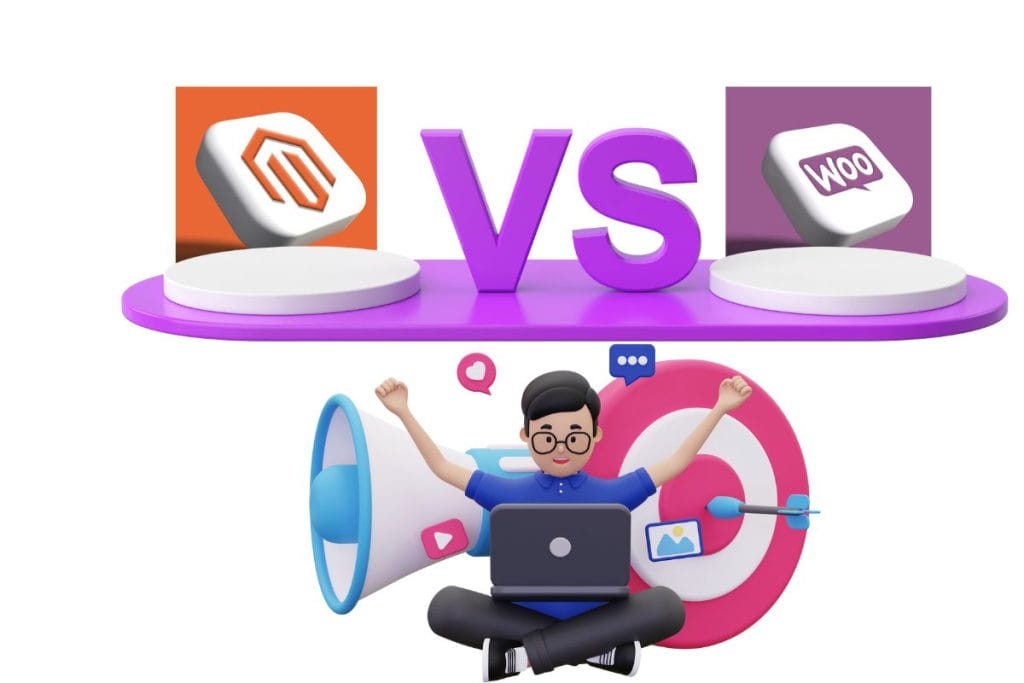Establishing an online store is now crucial for businesses to succeed in the modern digital era. But with so many e-commerce platforms out there, choosing the best one may be difficult. WooCommerce vs Magento are two well-liked choices that frequently come up in conversations. Based on a number of criteria, including features, usability, performance and speed, security, scalability, extensibility, marketing and search engine optimization, support, and cost, we will contrast these two platforms in this post. By the conclusion, you’ll know more clearly which platform is best for your type of business.
Introduction to WooCommerce and Magento
WooCommerce and Magento are both powerful self-hosted ecommerce platforms that offer a wide range of features. WooCommerce, launched in 2011, is an open-source plugin built on WordPress, the most popular CMS. It provides a quick and simple setup process, making it beginner-friendly. On the other hand, Magento, which was bought by Adobe in 2018, is a content management system (CMS) specifically designed for ecommerce. It is more complex and requires some technical knowledge, making it more suitable for developers.
Features and Flexibility
When it comes to features, both WooCommerce and Magento offer robust functionalities. WooCommerce supports unlimited products and provides a massive library of extensions to enhance its built-in features. It also offers free and premium themes, making it easy to customize the appearance of your online store. On the other hand, Magento offers support for unlimited products and provides hundreds of free extensions. It also has a theming and layout system that allows for extensive customization options.
Ease of Use
For beginners, ease of use is a crucial factor in choosing an ecommerce platform. WooCommerce takes the lead in this aspect as it is built on WordPress, which is known for its user-friendly interface. Setting up a WooCommerce store is as simple as installing the plugin and following the setup wizard. On the other hand, Magento requires some technical knowledge and may not be the best option for beginners. It involves a learning curve and requires some development skills to set up and configure.
Speed and Performance
The speed and performance of your online store play a vital role in providing a smooth shopping experience for your customers. While both WooCommerce and Magento can deliver fast-loading websites, the actual performance depends on various factors. According to a Quanta research study, Magento had faster loading times than WooCommerce. However, factors such as hosting plan, number of plugins and extensions, and image optimization can affect the speed of both platforms. It’s worth noting that WooCommerce offers some extremely fast themes.
Security
Ensuring the security of your online store is crucial to protect your customers’ data and build trust. Both WooCommerce and Magento are open-source platforms, meaning store owners need to take active measures to safeguard their sites. Magento generally requires fewer plugins than WooCommerce, reducing the risk of security vulnerabilities. It also offers dedicated security patches, although implementing them may require professional help. WooCommerce, on the other hand, provides regular updates, built-in security features, and a wide range of security extensions.
Scalability
Scalability is an important consideration, especially if you expect your business to grow rapidly. Both Magento and WooCommerce support an unlimited number of products, making them suitable for businesses of all sizes. However, it’s worth mentioning that Magento Commerce, the enterprise version, is more scalable compared to the free, open-source version. If you anticipate processing a large number of orders, Magento Commerce might be the better option. WooCommerce, on the other hand, can also handle high volumes of orders with the right hosting plan.
Extensibility
Both WooCommerce and Magento offer extensive options for extending the functionality of your online store. WooCommerce has thousands of extensions available in its marketplace, offering additional features and integrations. These extensions range from payment gateways to SEO plugins. Magento also offers thousands of extensions, both free and paid, that expand its capabilities. However, Magento extensions tend to be more complex and powerful, while WooCommerce extensions are generally more affordable and easier to install.
Marketing and SEO
To drive traffic to your online store, it’s crucial to have robust marketing and SEO features. WooCommerce, being built on WordPress, already includes many features and functionality needed for content marketing campaigns. It can be further optimized with various marketing and SEO plugins, such as Yoast SEO. Magento, on the other hand, does not come with built-in blogging functionality, but it offers extensions that can integrate your site with marketing tools like Google Analytics. Magento also provides advanced marketing tools in its Enterprise version.
Support
When it comes to support, both WooCommerce vs Magento have large and supportive communities. WooCommerce provides a public knowledge base filled with tutorials and guides, while dedicated support is available for paid extensions. Magento offers online support forums for the free version, and dedicated support is available through a Commerce plan. It’s worth noting that Magento’s support documentation and implementation can be more complex, and you may need to hire a developer for assistance.
Pricing
The cost of an ecommerce platform is a significant factor for businesses. Both WooCommerce vs Magento offer their core code for free, but customization and additional features come at a cost. WooCommerce premium extensions are generally more affordable than Magento’s. Magento Enterprise, the enterprise version of Magento, does not provide pricing on its website, but it can cost around $2,000 per month. Additionally, you need to consider the costs of purchasing a domain and a hosting plan, which may vary depending on your requirements.
Conclusion
Choosing the right ecommerce platform is crucial for the success of your online store. WooCommerce vs Magento are both powerful options with a wide range of features. If you’re a smaller business or a beginner, WooCommerce’s user-friendly interface and affordable extensions make it a suitable choice. On the other hand, Magento is more suitable for developers and businesses looking for advanced features and scalability. Consider your specific requirements, budget, and technical expertise when making your decision.
Interesting Reads:
11 Best Social Media Plugins For WordPress








